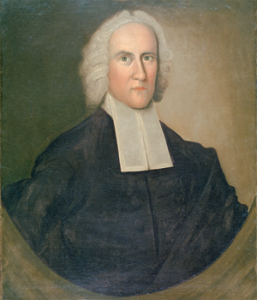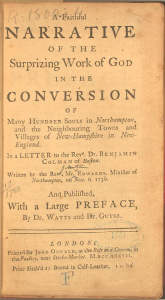Last week, I introduced the historic event known as the First Great Awakening and wrote about the influence of William and Gilbert Tennant, who established a Log College for training ministers in extemporaneous preaching. This week, I want to look at someone who was just as influential, but entirely different in manner.
 Jonathan Edwards was a Massachusetts Congregationalist minister who is widely respected among theologians today for his thoughts on the love of God. He was a central figure in the Awakening, yet he wasn’t like the preachers being trained by the Tennants. His methods might be styled more “old school.”
Jonathan Edwards was a Massachusetts Congregationalist minister who is widely respected among theologians today for his thoughts on the love of God. He was a central figure in the Awakening, yet he wasn’t like the preachers being trained by the Tennants. His methods might be styled more “old school.”
Edwards certainly wanted to lead his hearers into a life of obedience to God, but not by any type of emotional appeal—at least in his manner of preaching. He never spoke extemporaneously, but spent a lot of time developing the logic of his sermons. Then when he delivered them, he chose to memorize them first, and recite them to the congregation. He didn’t use much inflection in his voice and didn’t look directly at the parishioners. Instead, he would stare at the back wall as he gave them his memorized sermon.
 That certainly sounds, on the surface, like a recipe for utter boredom. Yet there must have been something in his countenance and the way he spoke that captured people’s attention. His church experienced an awakening in the 1730s, well before the mighty wave that followed with the arrival of George Whitefield (my next subject on this topic). It was such a deep renewal of faith that Edwards wrote about it in detail.
That certainly sounds, on the surface, like a recipe for utter boredom. Yet there must have been something in his countenance and the way he spoke that captured people’s attention. His church experienced an awakening in the 1730s, well before the mighty wave that followed with the arrival of George Whitefield (my next subject on this topic). It was such a deep renewal of faith that Edwards wrote about it in detail.
He called his treatise A Faithful Narrative of the Surprizing [sic] Work of God. That’s the short version of the title; long titles were common practice back then. If you ever want to find out what took place in Edwards’s church, you can find this testimony online.
Edwards, though, is probably best known for one particular sermon, preached in a Connecticut church in 1741. It is called Sinners in the Hands of an Angry God. While that may sound rather startling for the theologian of God’s love, if one looks at it carefully, it is clear that what he is upholding is God’s enduring patience with sinners. The warning, however, is that if we resist His calling on our lives and die without taking advantage of His redemption, we can’t expect patience anymore. All that is left is the Judgment.
Here’s one of the more striking passages from that sermon:
The God that holds you over the pit of hell, much as one holds a spider, or some loathsome insect over the fire, abhors you, and is dreadfully provoked: his wrath towards you burns like fire; he looks upon you as worthy of nothing else, but to be cast into the fire; he is of purer eyes than to bear to have you in his sight; you are ten thousand times more abominable in his eyes, than the most hateful venomous serpent is in ours. You have offended him infinitely more than ever a stubborn rebel did his prince; and yet it is nothing but his hand that holds you from falling into the fire every moment. It is to be ascribed to nothing else, that you did not go to hell the last night; that you was suffered to awake again in this world, after you closed your eyes to sleep. And there is no other reason to be given, why you have not dropped into hell since you arose in the morning, but that God’s hand has held you up. There is no other reason to be given why you have not gone to hell, since you have sat here in the house of God, provoking his pure eyes by your sinful wicked manner of attending his solemn worship. Yea, there is nothing else that is to be given as a reason why you do not this very moment drop down into hell.
We are told that these words cut to the hearts of so many that morning that they were crying out not to be thrust into the flames. How do we know this was the Spirit of God at work and not the manipulation of a preacher? How many people today do you think would be so impacted by a man who spoke a memorized sermon to them in a flat voice while staring at the back wall? There was no manipulation here; merely a warning taken from the truth of God’s Word. Hearts, apparently, were prepared to hear the warning.
In 1757, Edwards took on the task of the presidency of the College of New Jersey (later known as Princeton). The trustees wanted someone who had that kind of dedication to the Awakening to guide the students. Unfortunately, he died from a smallpox vaccination only one month after being installed as the president.
Although Edwards’s ministry was cut short, his accomplishments as a pastor/teacher/preacher and as a theologian are highly regarded today.
